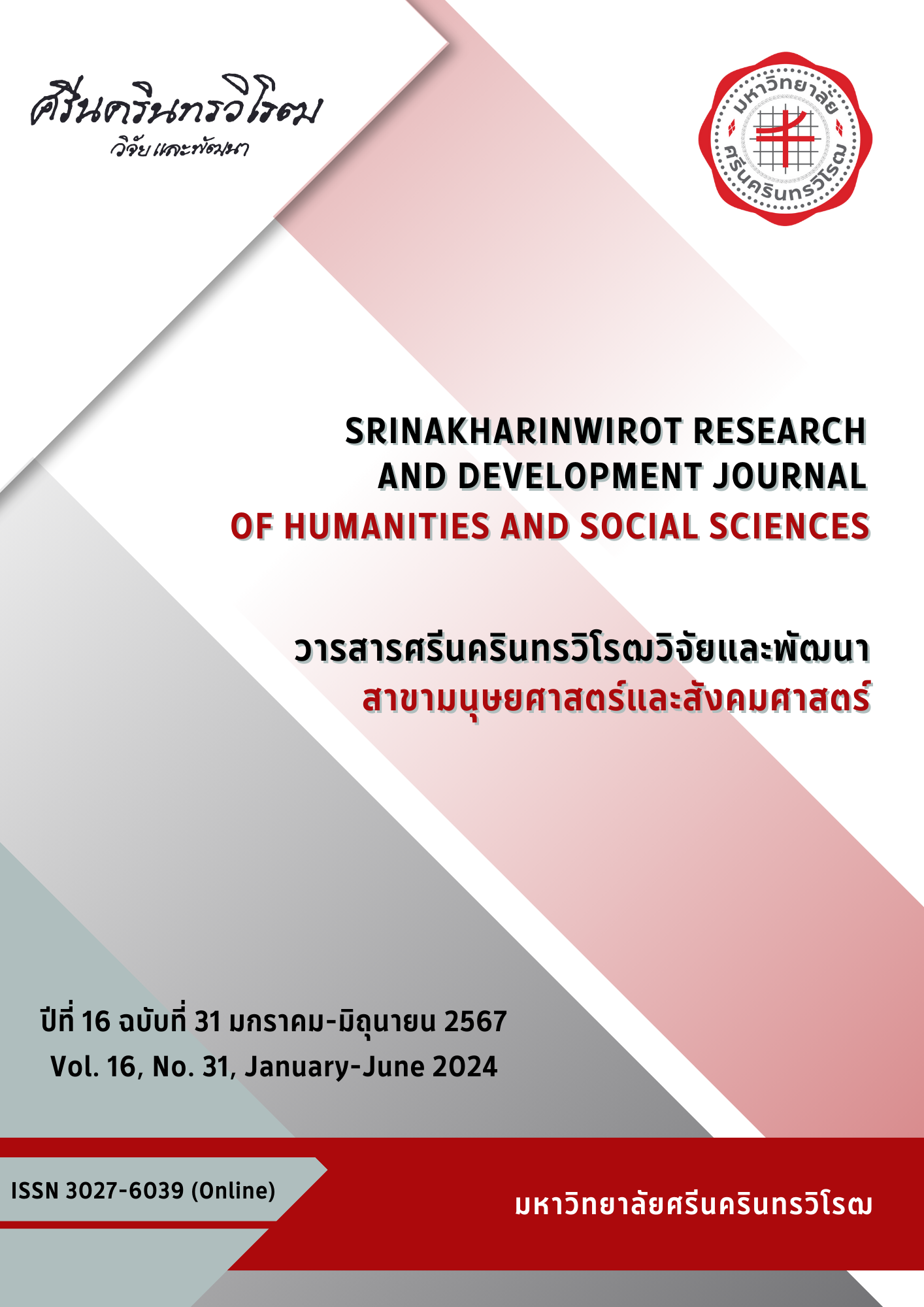DEVELOPMENT OF A GUIDELINE PROTOTYPE FOR STUDENT SUPPORT IN VOCATIOANAL EDUCATION INSTITUTIONS TO PROMOTE EMPLOYMENT OF STUDENT WITH SPECIAL NEEDS
Keywords:
Student Supports, Students with Special Needs, Vocational Education, Design ThinkingAbstract
This present study aims to develop and propose a guideline prototype for student support that fits the context of the vocational education institutions to promote employment of students with special needs. To design the prototype, research design principle of Design Thinking (DT) was employed. The target participants included students with special needs, their parents, and personel from five vocational institutions in Thailand. The study was conducted in three phases. In phase 1, “Emphasize”, qualitative methodology was used to gather experiences of the participants. In phase 2, “Define” and “Ideate”, results of phase 1 was used to define the problems and brainstorming solution ideas with experts from related fields. In phase 3, “Prototype” and “Test”, the team analyzed the data from phase 2 and incorporated the result for prototype designing. The prototype, then, was implemented with the participants. The results from the “Test” procedure, were used to revise the prototype so that it become more completed and ready to present. It was found that the prototype consisted of 2 main components: A training program for enhancing teachers’ competencies in providing supporting for students with special needs and an implementation process toward sustainability. The training program in this research consisted of the training content designed to match the teachers’ needs and the planning toolkits for career goal settings; need analysis and student supports; curriculum and instruction modification; and progress monitoring. The includemplementation process includeincludeed 5 steps: 1) basic training, 2) buy-in and team building, 3) intermediate training, 4) initial implementation, and 5) coaching and evaluation. The final prototype was proposed with an aim to increase the quality of supports for students with special needs for career in vocational colleges.
Downloads
References
National Council on Disability. (2003). People with disabilities and postsecondary education: Position paper. http://www.ncd.gov/publications/2003/Sept152003
Oertle, K. M., and Bragg, D. D. (2014). Transitioning students with disabilities: Community college policies and practices. Journal of Disability Policy Studies, 25(1), 59-67. https://doi.org/10.1177/1044207314526435
Balcazar, F. E., Taylor-Rizler, T., Dimpfi, S., Portillo-Pena, N., Guzman, A., Schiff, R., and Murvay, M. (2012). Improving the transition outcomes of low-income minority youth with disabilities. A Special Education Journal, 20, 114-132. http://doi.org/10.1080/09362835.2012.670599
Graham-Smith, S., and Lafayette, S. (2004). Quality disability support for promoting belonging and academic success within the college community. College Student Journal, 38, 90-99.
ชนิศา ตันติเฉลิม, สิริฉันท์ สถิรคุณ เตชพาหพงศ์, วิรุจ กิจนันทวิวัฒน์, บุณฑริกา บูลภักดิ์, วาทินี อมรไพศาลเลิศ, และดุสิดา ทินมาลา. (2563). การศึกษาสภาพและปัญหาของการจัดการศึกษาในสายอาชีพสำหรับผู้เรียนที่มีความต้องการพิเศษทางการเรียนรู้. วารสารวิทยาลัยราชสุดาเพื่อการวิจัยและพัฒนาคนพิการ, 16(1), 33-45.
Bryant, D. P., Bryant, B. R., and Smith, D. D. (2019). Teaching students with special needs in inclusive classrooms. Sage Publications.
Gartin, B. C., and Murdick, N. L. (2005). Idea 2004: The IEP. Remedial and Special Education, 26(6), 327-331. https://doi.org/10.1177/07419325050260060301
Meinel, C., and Leifer, L. (2011) Design thinking research. In H. Plattner, C. Meinel, and L. Leifer (eds.). Design thinking research: Understand-Improve-Apply. Springer Heidelberg Dordrecht: New York.
Tschimmel, K. (2012). Design Thinking as an effective Toolkit for Innovation. In ISPIM Conference Proceedings. The International Society for Professional Innovation Management (ISPIM).
สุวิมล ว่องวาณิช. (2563). การวิจัยการออกแบบทางการศึกษา. สำนักพิมพ์จุฬาลงกรณ์มหาวิทยาลัย
Yayici, E. (2016). Design thinking methodology book. ArtBizTech.
Brewer, R., and Movahedazarhouligh, S. (2019). Students with intellectual and developmental disabilities in inclusive higher education: Perceptions of stakeholders in a first-year experience. International Journal of Inclusive Education, 1-17. https://doi.org/10.1080/13603116.2019.1597184
Snyder, P., Hemmeter, M. L., McLean, M., Sandall, S., McLaughlin, T., and Algina, J. (2018). Effects of professional development on preschool teachers’ use of embedded instruction practices. Exceptional Children, 84(2), 213-232. https://doi.org/10.1177/0014402917735512
Brown, K. R., and Coomes, M. D. (2016). A spectrum of support: Current and best practices for students with autism spectrum disorder (ASD) at community colleges. Community College Journal of Research and Practice, 40(6), 465-479.
Schunk, D. H., and Bursuck, W. (2012). Self-regulation and disability. Handbook of positive psychology and disability, 265-278.
Zimmerman, B. J., and Schunk, D. H. (2011). Self-regulated learning and performance: An introduction and an overview. In B. J. Zimmerman and D. H. Schunk (Eds.), Handbook of self-regulation of learning and performance (pp. 1-12). Routledge/Taylor & Francis Group.
Moriña, A. (2017). Inclusive education in higher education: Challenges and opportunities. European Journal of Special Needs Education, 32(1), 3-17. https://doi.org/10.1080/08856257.2016.1254964
Griful-Freixenet, J., Struyven, K., Verstichele, M., and Andries, C. (2017). Higher education students with disabilities speaking out: Perceived barriers and opportunities of the Universal Design for Learning framework. Disability & Society, 32(10), 1627-1649.
Fixsen, D. L., Blase, K. A., Naoom, S. F., and Wallace, F. (2009). Core implementation components. Research on Social Work Practice, 19(5), 531–540. https://doi.org/10.1177/1049731509335549
Odom, S. L. (2009). The tie that binds: Evidence-based practice, implementation science, and outcomes for children. Topics in Early Childhood Special Education, 29(1), 53-61. https://doi.org/10.1177/0271121408329171
Vaughn, S., Klingner, J., and Hughes, M. (2000). Sustainability of research-based practices. Exceptional Children, 66(2), 163-171. https://doi.org/10.1177/001440290006600202
Amornpaisarnloet, W. (2021). Translating National Policies to School-Wide Practices. In U. Sharma (Ed.), Oxford Research Encyclopedia of Education (pp. 1521-1534). Oxford University Press. https://doi.org/10.1093/acrefore/9780190264093.013.ORE_EDU-01206.R1
Downloads
Published
How to Cite
Issue
Section
License
Copyright (c) 2024 Srinakharinwirot Research and Development Journal of Humanities and Social Sciences

This work is licensed under a Creative Commons Attribution-NonCommercial-NoDerivatives 4.0 International License.
Srinakharinwirot Research and Development Journal of Humanities and Social Sciences is licensed Under a Creative Commons Attribution-NonCommercial-NoDerivs 4.0 International (CC-BY-NC-ND 4.0) License, Unless Otherwise Stated. Please Read Journal Policies Page for More Information on Open Access, Copyright and Permissions.



